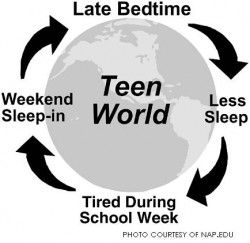
While scrolling through Twitter–much like any other teenager–I found a picture insisting shifting sleep hours earlier (and getting eight hours of sleep) would make all of America’s sleep deprivation disappear. I wasn’t ready to accommodate for eight hours, but the idea of shifting sleep time earlier was intriguing, especially if it was going to possibly improve my sleep. At the time of this discovery, my sleep schedule was 10:30 p.m. to 5:30 a.m. If you do not feel like doing math, that is seven hours of sleep. This is a pretty amazing feat for a junior in highschool, but it is still several hours less than a teenager should be getting. If the situation could be ameliorated by a simple time shift, I was all for it. For the last three weeks, I have gone to bed at 9:30 p.m. and woken up at 4:30 a.m.
I have tracked my thoughts on the progression of this new habit thus far.
Week 1:
I have just begun adjusting to this one-hour shift. I hoped my sleep quality would improve, but it appears it has not. Perhaps this is a result of my teenage sleep cycle. Despite this information, this cycle seems to work for me, giving me the leeway for mild procrastination I so desperately desired.
Furthermore, my enthusiasm in the morning proves that I, Sloane Coble, am a morning person. As before, I listen to music for thirty minutes, but now I get to work on whatever homework I have left. My productivity in the morning is twice what it is beyond dinner time.
Week 2:
Continuing this forming habit is not as painful as one might expect. I enjoy having this time to relax and get some homework done. Unfortunately, on Thursday, I failed to set my alarm. Luckily for me I had not left any homework for that morning, but I could not help but wonder if I actually slept through my alarm due to drowsiness. I suspect my body is taking longer to gel with the earlier sleep cycle than I had originally expected. I hope to stick with the schedule as I am still satisfied with the leisure of my mornings, and according to a psychology study, it takes about 66 days to completely form a habit.
Week 3:
I am now three days into three weeks, or on Day 13 (I have been sleeping differently on the weekends). According to the study referenced above, this is only about one-fifth of the way to the habitual stage. As today is a day off for students, I let myself catch up on sleep. After sleeping for approximately nine hours then napping another hour this afternoon, I see I still need more sleep. With the end-of-quarter catch up work due, I will be cutting sleep.
While I have already become somewhat attached to my new schedule, I am considering adding about 30 minutes of sleep: going to bed at 9:30 p.m. and waking up at 5. The half hour would not affect me much day-to-day, but I would be getting 2.5 hours of more sleep each week.
Conclusions:
Paying attention to work and sleep schedules more closely would highly benefit high school students all over the nation. Perhaps this sleep model works best with the progressive high schools starting at a later time, simply because “waking up early” wouldn’t be nearly as early as 4:30 a.m. Ultimately, a schedule in which students can get home, have time to relax, do some homework, then sleep eight hours is an ideal one; allocated time in the mornings for any extra work or play time promotes such a plan.
After sleeping for seven hours each night and waking up at 4:30 a.m. for three weeks, it seems it has been a great plan with not-so-great sleep. It appears if I insist upon waking up earlier–which I do–I also must work in an extra half hour or so. In changing my newfound practice, I hope to find a sleep balance that just might help me survive the rest of high school.